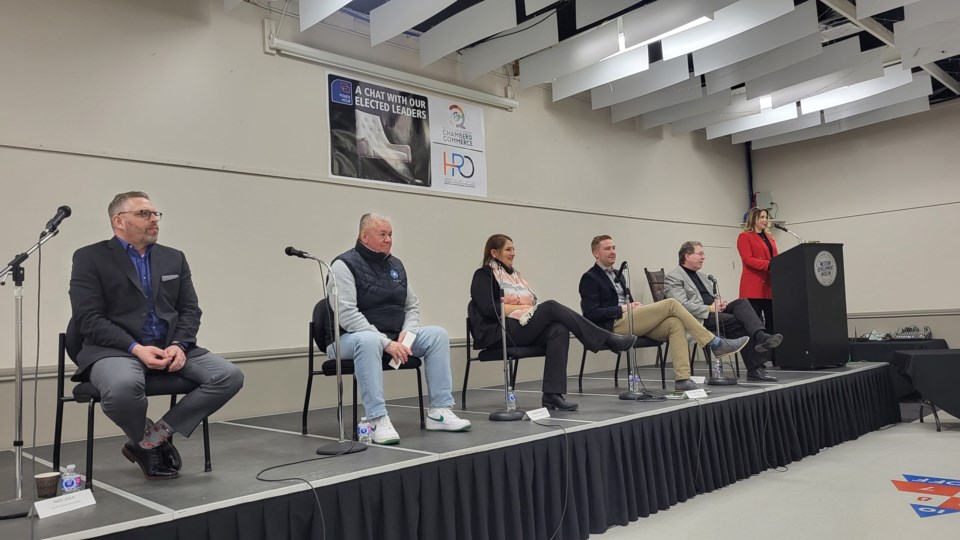THE BATTLEFORDS — As the City of North Battleford prepares to take the fight against the Crime Severity Index to Ottawa along with the provincial government, other elected officials wonder if that's the right direction.
Battleford Mayor Ames Leslie has said he's not as concerned about not being 'Canada's Crime Capital' as the City of North Battleford is.
"Yeah, I guess I'm always the person on the other side," Mayor Leslie said.
"I think that like Rosemarie [Falk, MP] said we need to continually address the root causes," he said, addressing Falk's previous comments at this year's Battlefords and District Chamber of Commerce Power Hour where she'd said crime is a complex topic.
"Let's be honest we have a crime issue in the Battlefords," he added.
Since CSI numbers have been released by Statistics Canada, North Battleford has been saddled with the infamous position as the most dangerous city in Canada.
"I think putting our head in the sand and trying to deflect that fact that the Battlefords and the region have a crime problem is not helping anything."
Though he understands fighting to end the CSI, he says years ago regional groups were talking about the lack of a dextox centre in the Battlefords.
He added that now with the new Poundmaker Lodge setting up shop in town, the work to deal with underlying social issues is continuing.
"We [Mayor Leslie and Mayor David Gillan of North Battleford] meet with our Indigenous leaders to say, 'how can we help in that sector for your cultural approach.'"
He noted that Battleford has worked with Mosquito Grizzly Bears' Head Lean Man First Nation (MGBHLM) to build The Ridge which he said, has a facility to help Indigenous people as well.
"Until we start addressing some of the root causes ... it doesn't matter what list we're on or not on, if it's not getting any better in the Battlefords.
"And we just have to continue to fight that way."
A view through an Indigenous lens
"When I heard about the meeting on the [CSI] I was pretty mad because I was not invited to the meeting," Wayne Semaganis, Tribal Chief with Battlefords Tribal Chiefs (BTC) said.
"It was supposed to be a place for all First Nations leaders to go there to be a part of the solution."
Though he thanked Chief Lori Whitecalf for attending on behalf of Sweetgrass First Nations, he noted that she's only one person and one First Nation.
"And the issues that have to be discussed are hard issues," he said, "and not many people are willing to step up and say the things that need to be said.
"It was a crime to be an Indian. That's why our languages got taken away, our spirituality, our children, our ways of life ... our freedom to travel on the land that we agreed to share with the Queen's people.
"If you want to talk about addressing issues, address issues with your treaty partner."
Semaganis said that when he was a child growing up in Little Pine, his family was poor, along with many other families. But, the adults in their community didn't let the youth turn to bad habits.
With little funding, every winter and summer their parents got together and made sure that the youth were involved in healthy pastimes, including setting up local sports teams each year.
"Everything was great. Where are those things today in our big areas that we share together?
"I would like to see that [pride in volunteering] back, but we keep waiting for somebody with deep pockets to come and start it for us."
Every weekend, Semaganis's son comes home with all his friends.
"And you know what? Maybe there's two Indian boys with him and the rest are kids from town and I never have any problems with them, they're all polite, respectful.
"We should all be that parent that neighbour for everybody else's children. We shouldn't blame the system, we should be looking at solutions not talking about the problems."
He noted that everyone in Saskatchewan needs to work with each other.
"I hear complaints in Saskatoon about homeless people. And I read some of the very negative comments, 'why don't they go back to the reserve or their house?' You know, we're so proud we can build shelters for dogs and cats but we won't even look after each other as humans?"
"That's our responsibility to look after each other...we have to take those steps and not blame the system and not blame each other."
Originally published in the Battlefords Regional News-Optimist on March 14.



